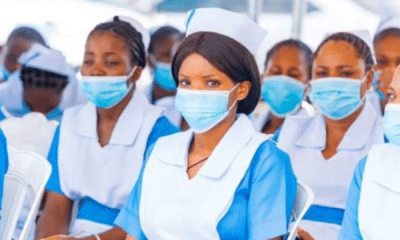Nigeria News
Japa: Nurses Gear Up For Confrontation Over Federal Government’s Attempt To Delay Processes

Members of the National Association of Nigeria Nurses and Midwives are experiencing increased tension as they contemplate confronting the Nursing and Midwifery Council of Nigeria regarding new guidelines for certificate verification.
Naija News gathered that Nurses and midwives across the country expressed distress earlier in the week over the deactivation of the NMCN verification portal since December 2023.
The nurses alleged that the council deliberately disabled the portal to impede their ability to pursue career opportunities abroad.
They also suggested that this action could be linked to the Federal Government’s strategy to decrease the number of health workers seeking opportunities abroad in search of better prospects.
Naija News reports that the Nursing and Midwifery Council of Nigeria (NMCN) issued a memorandum dated February 7, 2024, outlining revised guidelines for requesting certificate verification for nurses and midwives.
According to the NMCN, eligible applicants must possess a minimum of two years of post-qualification experience from the date of issuance of the permanent practicing license.
The memo was distributed to various entities, including state ministries of Health, university teaching hospitals, specialist and federal medical centres, the National Association of Nigeria Nurses and Midwives (NANNM) headquarters, universities offering nursing programs, colleges of nursing sciences, schools of nursing and midwifery, all post-basic nursing programs, and all nursing and midwifery councils’ zonal offices.
The NMCN, as the primary legal body under the Federal Government, ensures safe and effective nursing and midwifery care through quality education and practices. It regulates standards of education and practice in Nigeria, adjusting them to evolving health needs.
The NANNM reported in 2023 that more than 75,000 nurses and midwives had departed the country in search of better opportunities over a five-year period.
The association expressed concern over rising insecurity, including increased kidnappings and violence against its members in the workplace.
The President of the association, Michael Nnachi, said, “As a result of poor wages and lack of decent work environments, over 75,000 nurses and midwives have emigrated from Nigeria within five years.
“Shortage of nurses and midwives, especially in certain areas of specialisation and geographic regions, the increased rates of attrition and a chronic shortage of nursing personnel in the country increased workloads on nurses without an equivalent compensation, exposing them to more health hazards and compromising the quality of healthcare delivery.”
The extensive migration of nurses has intensified an already prevalent shortage of healthcare workers, posing substantial challenges to the healthcare delivery system and limiting access to care for many individuals.
Nnachi emphasized that the ongoing brain drain was affecting the health sector’s workforce.
He said, “It is overstretching nurses who are not even well-paid or well-compensated. It is overstretching the workforce. Look at the way the country is, there is insecurity. Prices of commodities have gone up in the market, and you are earning a salary that has remained stagnant all this while. So, how can you cope economically?”






